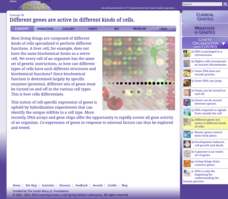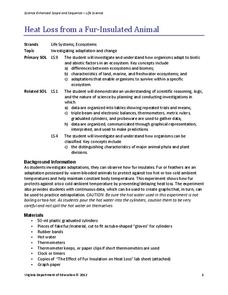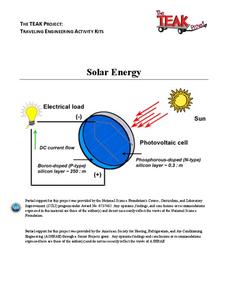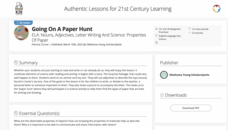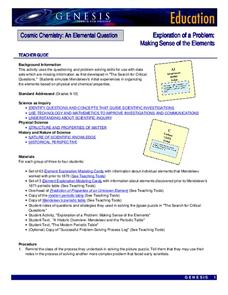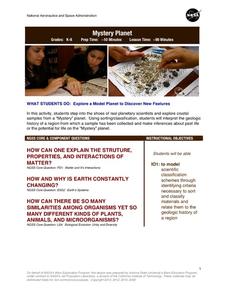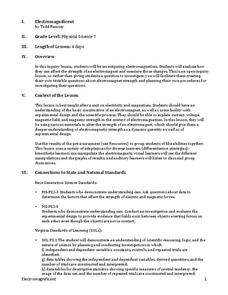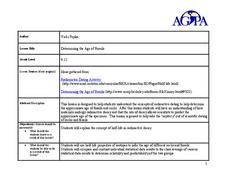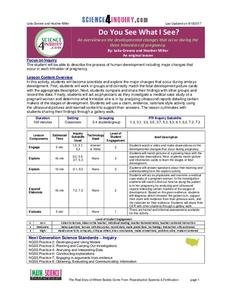NASA
Melting Ice: Designing an Experiment
Sometimes, despite the best laid plans, the unexpected will occur. Learners witness this firsthand as they carefully design an experiment to determine the time needed for ice to melt in salt water or pure water. They uncover facts not...
Cold Spring Harbor Laboratory
Different Genes Are Active in Different Kinds of Cells
Personalized medicine prevents many trial-and-error scenarios when time counts the most. Learn how gene expression and screening genomes improves health outcomes in cancer patients, those with auto-immune disorders, and more. An online...
Virginia Department of Education
Heat Loss from a Fur-Insulated Animal
How do animals adapt to weather changes? Provide your class with the ability to understand adaptations and body temperature as they participate in this hands on experiment, using fake fur and hot water. Pupils collect data and analyze...
Curated OER
Human Body Series - Cardiovascular System
Pump up your class while studying the cardiovascular system with this pair of activities. In one, learners record heart rates during different actions. In the second, they read kid-friendly heart health articles online and then write a...
Rochester Institute of Technology
Solar Energy
Warm up to the idea of solar energy. A lesson includes three activities that challenge scholars to apply knowledge in new ways. First, they learn to run an alarm clock without a battery by using solar energy. Next, they complete an...
EduGAINs
Go Eco! Ecosystems
How is a movie theater like a desert biome? Compare systems to ecosystems with a set of activities that focuses on accessing multiple intelligences and building upon knowledge. As learners discuss the ways elements of an ecosystem depend...
Science 4 Inquiry
Battle of the Waves
Which travels faster, light or sound? Scholars work in groups to simulate the ability for waves to travel through solids, liquids, gases, and through a vacuum. Then, they learn about the properties of a mystery wave and must determine...
EngageNY
TASC Transition Curriculum: Workshop 12
How can opinions slant facts? Workshop participants learn how to examine primary and secondary sources and identify the author's point of view. They also examine how visual art impacts the meaning and rhetoric of sources. Full of...
Cold Spring Harbor Laboratory
The DNA Molecule Is Shaped like a Twisted Ladder
One of the first models of DNA appeared to be a triple helix. Young scientists learn about the many scientists who worked to find the shape of DNA. They observe multiple models, tests, and experiments to understand the conclusions. An...
Curated OER
The Gene Scene
Sixth-grade scientists gain understanding of how genetic traits manifest with simple experiments, such as determining whether their tongues are roller or non-roller, taster or non-taster. Extensions include performing tests at home with...
K20 LEARN
Going on a Paper Hunt: Nouns, Adjectives, Letter Writing and Science - Properties of Paper
A lesson introduces scholars to nouns and adjectives. After listening to a short story and practicing creating adjectives with a card sort, pupils go on a paper hunt to locate different types of paper, complete a chart with adjectives,...
Chymist
Visualizing pH
Why are acids and bases important in our daily lives? Lead the class in answering this question, among others, as they experiment with pH paper and classify where various substances belong on the pH scale. They also taste common acids...
Teach Engineering
Magnetic or Not?
The class must determine the magnetic properties of different materials, including aluminum and steel by sorting through materials using a magnet. Groups make a prediction on whether a material is magnetic and then perform tests to...
NASA
Exploration of a Problem: Making Sense of the Elements
When given too much data to simply memorize, it helps to sort it into manageable groups. The second lesson in the six-part series of Cosmic Chemistry challenges groups of pupils to take a large amount of data and figure out how to best...
New York State Education Department
TASC Transition Curriculum: Workshop 3
Teachers turning into high schoolers? It's not Freaky Friday! It's a thoughtful workshop that teaches participants how to plan professional development for staff. Third in a 15-part series, the workshop provides a platform for the other...
Scholastic
Study Jams! Scientific Methods
Middle school scientists learn the steps of the scientific method by watching this phenomenal film and by singing a karaoke song! They are introduced to making observations and hypotheses, determining variables, data collection, and...
NASA
Mystery Planet
What can one learn about a planet based on a small surface sample? Learners will explore artifacts from a mystery planet and see what they can determine about the planet based on the evidence in front of them.
Curated OER
Rainy Day Hike
Students develop awareness about the water cycles. They identify the watershed in which their school is located. They explain the role the schoolyard plays in the watershed.
Howard Hughes Medical Institute
Using DNA to Explore Lizard Phylogeny
In a fun and interactive two-day lesson, learners sort anole lizard pictures by appearance. Next, they watch a video about the anoles and re-sort based on the information in the video. In addition to physical characteristics, budding...
STEM for Teachers
Electromagnificent
This physics pun really hertz, but this STEM lesson plan can help. The inquiry-based activity has young scientists create a testable question about electromagnetic strength; plan and implement their own experiments; and record and...
Curated OER
Determining the Age of Fossils
Students examine the concept of radioactive dating. In this radioactive dating lesson, students investigate how to determine the ages of fossils and rocks as they learn about half-life radioactive decay.
Personal Genetics Education Project
Direct-to-consumer Genetic Testing
If you knew that you were likely to develop Alzheimer's disease in your future, how would it affect your life in the meantime? This and other similar thought-provoking questions are discussed in a lesson plan about the availability of...
Science 4 Inquiry
Do You See What I See?
In only nine months, a small group of cells grows into a fully developed baby. Pupils learn about the development of an embryo to a fetus to a baby. They identify each step of weekly development. Young scientists look at ultrasounds to...
Curated OER
The Living Environment
Sixth graders show what they know about plant and animal cells. For this cell project lesson, 6th graders get to choose a project based on their learning style. They can create a visual representation of cells, auditory forms, or build a...



